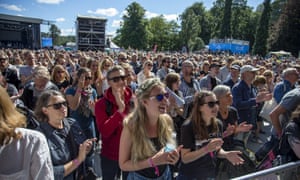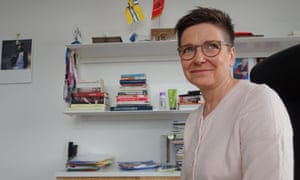The new 'people's home': how Sweden is waging war on inequality | Inequality
Karl Möller seems an unlikely poster child for a war on inequality. He is the lone male among a dozen women, each with a baby in her arms.
“I’m not used to it, but it’s a good experience â€" quite opposite to the male-dominated engineering workplaces I am accustomed to,†he says.
Möller, 45, is part of a city-wide programme in Gothenburg to mix social classes, genders and ethnicities to make Sweden’s second city a more equal place to live.
New integrated “family centres†such as this one, which opened in March, aim to target support at the families who need it most. “It is important for us to be in mixed areas to create more equality,†says manager Helen Antonson.
Gothenburg, and Sweden as a whole, takes equality very seriously. The country, ranked first out of 152 countries in Oxfam’s new Commitment to Reducing Inequality Index, has long been regarded across the world as a paragon of fairness.
The centre-left has governed the country for 81 of the past 100 years, striving to be “the people’s home†â€" or folkhemmet â€" in which the social democratic state was like a family, caring for all and with no one left behind. Sweden became one of the most socially equal countries in the world.
Yet despite its reputation, even Sweden has had to acknowledge its own inequality problem in recent decades.
“The fact is, the growth in inequality [in Sweden] since the 1980s has been the largest among all OECD countries,†says Per Molander, a former IMF adviser and author of a recent history of inequality.
“There is a lot of rhetorical agreement on equality: very few politicians would say they are against it because we have such a strong egalitarian tradition here. But there is a large gap between rhetoric and reality,†he adds.
Sweden now possesses 178 krona billionaires â€" an increase of 22 since 2015, a survey found last year. Together, they own more than twice the annual budget of the Swedish state, and the number of dollar millionaires is rising sharply too.
A fad among Stockholm’s gilded youth is vaskning â€" the ostentatious “sinking†of bottles of champagne by pouring them down the drain. Meanwhile, in Malmö, the infamous RosengÃ¥rd estate is populated by impoverished immigrants and a breeding ground for violent gangs.
Last year the UN children’s agency Unicef reported that Sweden was on a “downward trajectory†in terms of the life chances for its poorest children, a growing number of whom were “very disadvantagedâ€. A Swede with only a basic education can expect to live five years less than a university-educated compatriot, according to the country’s Public Health Agency.

The roots of this shift go back to the 1980s, Molander says, when the Social Democrats began experimenting with free-market policies and deregulated the credit market. But change accelerated after a deep economic crisis in the early 1990s.
“After that there was a sort of despair, a loss of control â€" the political energy to defend classical social democratic policies was simply not there any more,†Molander says.
Sweden’s centre-left pushed ahead with deregulation and privatisation of infrastructure â€" the post office, electricity, telecoms and the railways â€" while introducing “free schools†with private providers, on which David Cameron’s Tories modelled their education reforms of 2010.
Swedish Conservatives held office from 2006-14, cutting income and property taxes and repealing a tax on wealth, while introducing tax breaks for small business owners. Capital income from the sale of property and shares has soared owing to a booming housing market and stock exchange.
Senior managers’ income has “decoupled†from the rest, according to Thomas Carlén, an economist for LO, the country’s largest trade union confederation. “You can see growing inequality within firms here.â€
Creating an equal city
Despite three decades of deregulated markets, tax cuts and slimmed down welfare, Sweden still has some of the most progressive taxation and spending policies in the world, Oxfam says, while its support for women in the workplace is exemplary.
But where Sweden really stands out is in its redoubled efforts to reduce the gap between rich and poor, the report suggests.
The pendulum began to swing back in 2014 with the election of a centre-left coalition of the Social Democrats with the Green Party, which set out to reverse “irresponsible tax cutsâ€. Helped by a booming economy, the coalition has increased benefits for unemployment, sickness and families with children, raised income tax on the better off and tried to increase taxes on banks, aviation and dividends.

It also established a Commission for Equity in Health, declaring that “avoidable health gaps must be closed within a generationâ€.
While the measures are so far having a small effect in terms of redistributing wealth to the poorest, political opposition to them is fierce: “Big tax increases are now threatening jobs and growth,†says Conservative leader Anna Kinberg Batra.
In Gothenburg, Sweden’s industrial heartland, the new mayor has made tackling inequality her top priority.
“As a Social Democratic politician, you cannot have a bigger ambition than an equal society,†says Ann-Sofie Hermansson, 52, a former forklift driver at Volvo. “It is about decency, but it is also good for the economy … If you increase equality, you get more trust and stronger growth: it’s a win-win situation.â€
The gap between rich and poor has almost quadrupled in Gothenburg over two decades, according to a survey commissioned by the council. Its most shocking discovery was that people in affluent areas are living nine years longer than those in poorer ones.
When journalists compared a street of private mansions on the coast with overcrowded apartments occupied mainly by jobless immigrants on the other side of town, they found an income gap of more than half a million krona (£50,000).
The mayor’s flagship programme Equal Gothenburg, promises long-term investment to create a more egalitarian city.
“For many years we have had projects to fix inequality,†she says. “We’d take some money, we’d have a project in the suburbs, and then the money ends and the project stops. The idea of Equal Gothenburg is no more small projects: we should think about equality all the time when we plan.â€
Opposition to the programme is muted; while some question the goal of equality for its own sake when jobs are in short supply, on the right of the city council, criticism is more about how than why.
“We and the left parties have the same goal: that Gothenburg should be a cohesive city. But we have different means to reach that goal,†says David Lega, leader of the city’s Christian Democrats. “We have to put a lot of effort into improving the environment for small business, which creates nine out of every 10 new jobs.â€

The centre-left has controlled Gothenburg city council for 23 years, Lega points out: the very years during which inequalities have spiralled.
“To create a city that is equal it can’t be a side project, it needs to be in the foundations of the budget,†he says. “We need to focus on the long term rather than quick fixes.â€
Hermansson says she is helped by the fact that “all the big actors†in the debate are now concerned about inequality.
While the OECD in the 1990s applauded cuts to wages and welfare, it now produces research showing that inequality is bad for economic growth. The IMF, once a hard-nosed warrior for neoliberalism, puts addressing inequality squarely within its mandate to help countries improve their economic performance.
“It is a very big problem and there are a lot of political questions,†says Michael Ivarsson, director of Equal Gothenburg. “You have to be very humble.â€
The city will find itself in the European spotlight in November, when EU leaders gather in Gothenburg for a special Social Summit for Fair Jobs and Growth.
“Sweden looks relatively good in terms of health and inequalities, but our assumption â€" and the assumption of Swedish colleagues â€" is that they can do better,†says Prof Sir Michael Marmot, leader of a seminal World Health Organisation report that said health inequalities could be eradicated in a single generation.
“That is what we have to start with: there is more we can do, we can make a difference.â€
Oxfam concurs, suggesting even those at the top of its new ranking have room for improvement. More than two-thirds of the countries included in the index are doing less than half of what they could to reduce inequality, the report suggests.
Many people in Sweden, too, believe there is nothing inevitable about the growing gap between rich and poor. “It very often boils down to resources â€" too few teachers, nurses, other professions. And if you want to fix that, it will cost money,†says Olle Lundberg, chair of the country’s Commission for Heath Equity.
“But there has been a change in the political climate in Sweden. Now all the parties are talking about inequality.â€
- Follow the Guardian’s Inequality Project on Twitter here, or email us at inequality.project@theguardian.com

0 Response to "The new 'people's home': how Sweden is waging war on inequality | Inequality"
Posting Komentar